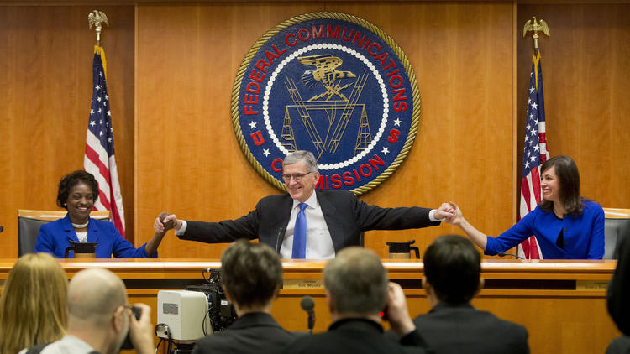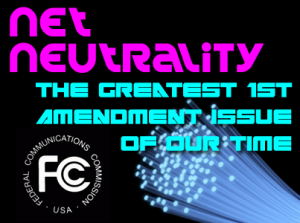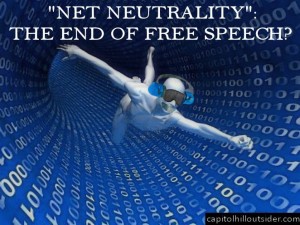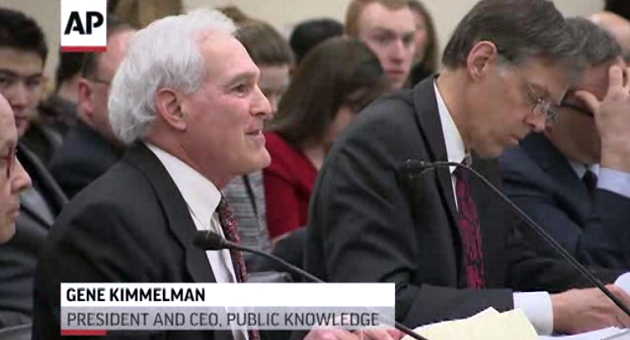By SUA Staff
The Obama/Democrat Party “fundamental transformation of America” just visited another terrible blow on capitalism and further increased the size of government.
It also sets the stage for international controls few can fathom. Look soon for a new cabinet department, the DOI, Department of the Internet. George Soros, John Podesta, and the White House have won.
The repercussions of the new regulations created by the FCC, effectively taking control over the internet, passed on a party line vote of the Commissioners, 3-2 are stunning and unmeasurable at this time.
In an expected 3-2 party-line vote, the agency’s Democrat majority approved a plan by FCC Chairman Tom Wheeler that puts broadband providers in the same legal category as more highly regulated conventional telephone companies.
Wheeler has promised a modernized, light-touch regulatory approach that would exempt Internet service from many of the tougher provisions of that designation under Title 2 of the telecommunications law, particularly rate regulation. (LA Times)
The unintended consequences of this move will likely yield a whole host of negative results – but is that really unintentional? But we won’t know until we wade through all 322 pages. Sound familiar?

Federal Communication Commission Chairman Tom Wheeler, center, joins hands with Commissioners Mignon Clyburn, left, and Jessica Rosenworcel, before the start of their meeting in Washington, D.C., Thursday to vote on tough net neutrality regulations. (Pablo Martinez Monsivais, AP)
The Chairman of the Commission and a supporter on the Commission said:
“The Internet is the most powerful and pervasive platform on the planet. It’s simply too important to be left without rules and without a referee on the field,” Wheeler said in voting for the proposal. “The Internet is simply too important to allow broadband providers to be the ones making the rules.
FCC member Jessica Rosenworcel, who voted for the regulations, said: “We cannot have a two-tiered Internet with fast lanes that speed the traffic of the privileged and leave the rest of us lagging behind.”
One of the two dissenting votes disagreed:
Ajit Pai, one of two Republicans on the FCC, said the new regulatory proposal abandoned 20 years of bipartisan consensus “to let the Internet grow free from utility-style regulation.”
“It seizes unilateral authority to regulate Internet conduct, to direct where Internet service providers make their investments and to determine what service plans will be available to the American public,” he said. (Read more at the LA Times.)
To those of us who work on the internet daily, many relying on it for their livelihood, we can see where this will go; all to fix something that was not broken. Market forces can get out of hand, and some regulation is necessary in some industries, but the internet is not just a “common carrier” of information – not by a long shot, it is not a utility.
In the Name of Consumer Protection
This is eerily similar to “pass the bill to see what’s in it” language that Nancy Pelosi told us about ObamaCare. Then, in a video posted by the LA Times about GOP concerns, Gene Kimmelman, President and CEO of Public knowledge stated in part in his response to concerns made by Rep. Greg Walden, R-OR:
“Sit back, and see what is put forward tomorrow…,” he may be a consumer advocate, but he is also all for the regulatory changes as he stated in his Senate testimony in January of this year. (While at the Department of Justice under Eric Holder, Kimmelman was referred to as Obama’s “Secret Weapon” on in the anti-trust division and was a Director at George Soros funded New America Foundation.)
Once again, we have to pass it so we can see what is in it. How would you like to be the CEO of a broadband provider who now has to see how his company’s future plans just changed unilaterally by bureaucrats? We see shades of the health care insurance industry, and health care provision issues all over again.
The internet is not just about downloading movies or songs, social networking, or blogging; and the free flow of ideas, innovation, creativity, and exploration, it is about commerce. Most of these attributes were not in any danger because the market self-selects and people vote with their wallets.
Unilateral Control
Those voting for the regulations claim it is about fairness – leveling the playing field. How level is level in the world of commerce and the free market?
 In our opinion, this effort was about control, not keeping something free, open, and fair.
In our opinion, this effort was about control, not keeping something free, open, and fair.
Once again, liberals use crafty language to sway the unknowing and couch arguments in “safety,” and “fair” jargon, with the real purpose being to have government make decisions for you “stupid” masses, just ask Jonathan Gruber.
If it was about controlling broadband providers and keeping the internet neutral, why did it take 322 pages of regulations and why did they keep it hidden from the public?
We do not know, but many warned the FCC not to mess with the Web’s still-developing economic ecosystem and may be a tragic threat of our 1st Amendment rights.
However, the debate is not over but the regulations are now here, unilateral government control of the internet by a single agency without Congressional input. Yes it was created by our military, but ours, as in we-the-people’s.
International Control
Next it will mutate into international control if they have their way. Somehow, we see the United Nations creating yet another commission and gaining control many feared when the story that the Commerce Department tackles the contract with ICANN next year came out.
As was reported last March, the international question of control arose again as the Washington Post’s Craig Timberg wrote:
U.S. officials announced plans Friday to relinquish federal government control over the administration of the Internet, a move that pleased international critics but alarmed some business leaders and others who rely on the smooth functioning of the Web.
Pressure to let go of the final vestiges of U.S. authority over the system of Web addresses and domain names that organize the Internet has been building for more than a decade and was supercharged by the backlash last year to revelations about National Security Agency surveillance.
The change would end the long-running contract between the Commerce Department and the Internet Corporation for Assigned Names and Numbers (ICANN), a California-based nonprofit group. That contract is set to expire next year but could be extended if the transition plan is not complete.
“We look forward to ICANN convening stakeholders across the global Internet community to craft an appropriate transition plan,” Lawrence E. Strickling, assistant secretary of commerce for communications and information, said in a statement. (Read more here at the Washington Post.)
Then Senate Commerce Committee Chairman John D. Rockefeller IV (D-W.Va.) said: “…consistent with other efforts the U.S. and our allies are making to promote a free and open Internet, and to preserve and advance the current multi-stakeholder model of global Internet governance.” Thank you Senator, we all feel safer now.
There you go, those “safety” and “comfort” words again. Now that the FCC has voted, the slippery slope was just greased with 40 weight motor oil. Back in March, former Speaker-of-the-House, Newt Gingrich said: “This risks foreign dictatorships defining the internet.”
Recently, the new Senate Commerce Committee Chairman John Thune of South Dakota opined:
“…by claiming more authority over Internet access for net neutrality, the Federal Communications Commission will undermine the ability of the U.S. to push back against international plots to control the Internet and censor content.
Countries like Russia already have made it clear that they want the International Telecommunications Union or another United Nations body to have more power over the Internet, Thune said.
“It seems like reclassifying broadband, as the administration is doing, is losing a valuable argument,” Thune said at his panel’s hearing on Internet governance. “How do you prevent ITU involvement when you’re pushing to reclassify the Internet under Title II of the Communications Act, and is everyone aware of that inherent contradiction?” (Read more at the National Journal.)
Trust in Government Agencies
How much trust do you have in our governmental agencies? How well have they run anything? Certainly politics will not be a concern.
Katherine Maher of Politico defended the idea of “It [Commerce and ICANN] intends to transition its coordinating role over the Internet’s domain name system—those web addresses you type into your browser—to the global Internet community” last March by saying:
It’s actually the opposite of what the critics claim: The Obama administration is trying to head off rising global pressure to give other countries, including China and Russia, more of a say in how the Internet is governed, not bow to it.
Her trust in the Commerce Department is a common problem, trust of a governmental agency that is at the whim of the current political tide has earned anything but. Ask yourself, who is the appointed Secretary of Commerce now and who will it be in the future? Who will be in charge of the FCC in the future?
If it is like the National Labor Safety Board that Obama tried to stack with cronies illegally, or ObamaCare that was shoved down our throats through the Department of Health and Human Services, be very afraid.
Maher continues:
“ICANN, [Internet Corporation for Assigned Names and Numbers] which was created primarily for the purpose of contracting to Commerce, is already a global body. Its headquarters are in California, but it has offices around the world and a governance model that includes representatives from 111 countries, international organizations and commercial and non-commercial stakeholders.”
“…there is no way Commerce will allow for a transition that doesn’t serve the public’s interest in a free and open Internet. The department controls the conditions, the timing and the ultimate approval of any new arrangement.”
If it is already international, why do the likes of China and Russia want more control? The simple answer is, they are actively seeking to reduce America to her knees, and Obama and his cronies are more than willing to “lead from behind” once again.
Say goodbye to your freedom on the internet, one already fraught with constant cyber-attacks, especially by the Chinese and Russians, and say hello to less privacy, higher bills, taxation, internet sales taxes, and limits on free speech.
How do you like all that flowery “comfort” jargon now? Free and open; fair? How about that doctor or health care plan you got to keep? Period! How about that “reset” with Russia? Is the internet the next Crimea?
How about that “targeting” issue? Do we really believe that a future administration would not “weaponize” the FCC like we all witnessed with the IRS? This will morph, of that we can be sure.


